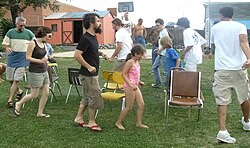This is an old revision of this page, as edited by MultiJames 1995 (talk | contribs) at 03:15, 15 October 2023 (→In popular culture). The present address (URL) is a permanent link to this revision, which may differ significantly from the current revision.
Revision as of 03:15, 15 October 2023 by MultiJames 1995 (talk | contribs) (→In popular culture)(diff) ← Previous revision | Latest revision (diff) | Newer revision → (diff) Elimination genre party game "Trip to Jerusalem" redirects here. For the public house in Nottingham, see Ye Olde Trip to Jerusalem. For other uses, see Musical chairs (disambiguation).| This article needs additional citations for verification. Please help improve this article by adding citations to reliable sources. Unsourced material may be challenged and removed. Find sources: "Musical chairs" – news · newspapers · books · scholar · JSTOR (February 2021) (Learn how and when to remove this message) |
Musical chairs, also known as Trip to Jerusalem, is a game of elimination involving players, chairs, and music. It is a staple of many parties worldwide.
Gameplay
A set of chairs is arranged with one fewer chair than the number of players (for example, seven players would use six chairs). While music plays, the contestants walk around the set of chairs. When the music stops abruptly, all players must find their own individual chair to occupy. The player who fails to sit on a chair is eliminated. A chair is then removed for the next round, and the process repeats until only one player remains and is declared the winner.
In Wales, musical chairs had a similar custom to the modern version, with slight differences; the boys would always sit whilst the girls would skip around, always outnumbering the boys. If a girl didn't sit fast enough on the boy's lap, she would have to forfeit. This would continue until the end when the winning girl would kiss the last boy.
History of the name
| This section does not cite any sources. Please help improve this section by adding citations to reliable sources. Unsourced material may be challenged and removed. (July 2021) (Learn how and when to remove this message) |
The origins of the game's name as "Trip to Jerusalem" is disputed. However, it is known to come from its German name Reise Nach Jerusalem ("The Journey to Jerusalem"). One theory suggests that the name was inspired by the Crusades, wherein several heavy losses were incurred. Another theory suggests that it was inspired by the Aliyah, the immigration of Jews from the diaspora to the Land of Israel (which includes the modern State of Israel), wherein it is stated that spaces on ships taking the Jews to the said land were limited. None of these theories were officially confirmed.
As metaphor
The term "playing musical chairs" is also a metaphor for describing any activity where items or people are repeatedly and usually pointlessly shuffled among various locations or positions. It can also refer to a condition where people have to expend time searching for a resource, such as having to travel from one gasoline station to another when there is a shortage. It may also refer to political situations where one leader replaces another, only to be rapidly replaced due to the instability of the governing system (see cabinet reshuffle).
In popular culture
The game is featured in the musical Evita during the number "The Art of the Possible", and serves as a symbol of Juan Perón's rise to power. In this sequence, Peron and a number of military officers play the game, which the former wins.
The game is used on the lenten special of Sunday PinaSaya entitled "Trip to Jerusalem" aired on GMA Network in April 9, 2017. It featured the young girl Jessie (played by Barbie Forteza) challenges against the seven ladies for the people escapes from the prison.
See also
- Buggins' turn
- Chinese fire drill
- Hot desking
- Level-coil
- Oh Sit!, a game show based on musical chairs
References
- Orlick, Terry (2006). "No-Elimination Games". Cooperative Games and Sports: Joyful Activities for Everyone. Human Kinetics. p. 21. ISBN 9780736057974.
- "Watch Dyma'r Urdd".
- Team, Gamesver (2022-02-23). "History of Musical Chairs (Game) - Origins, Meaning, Metaphor,…". Gamesver. Retrieved 2023-10-12.
| Party games | |
|---|---|
| Guessing games | |
| Other games | |





